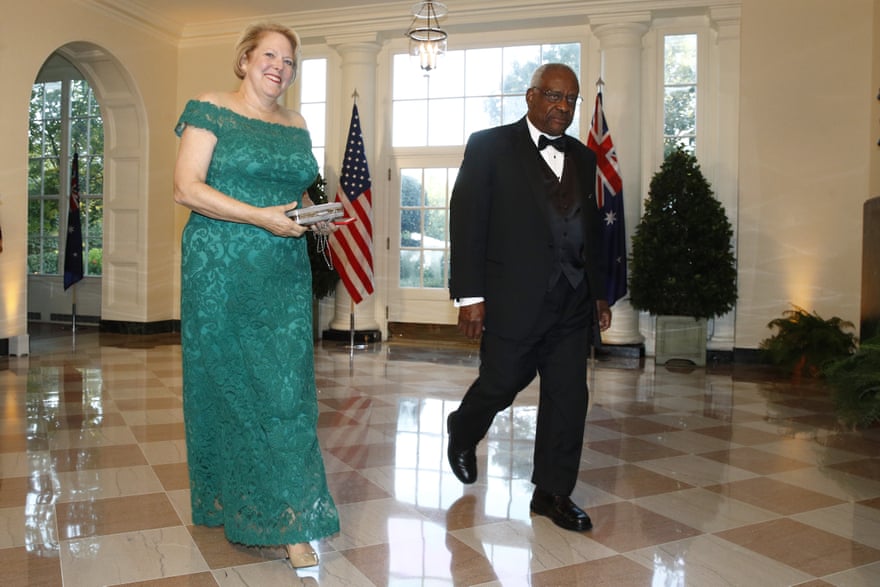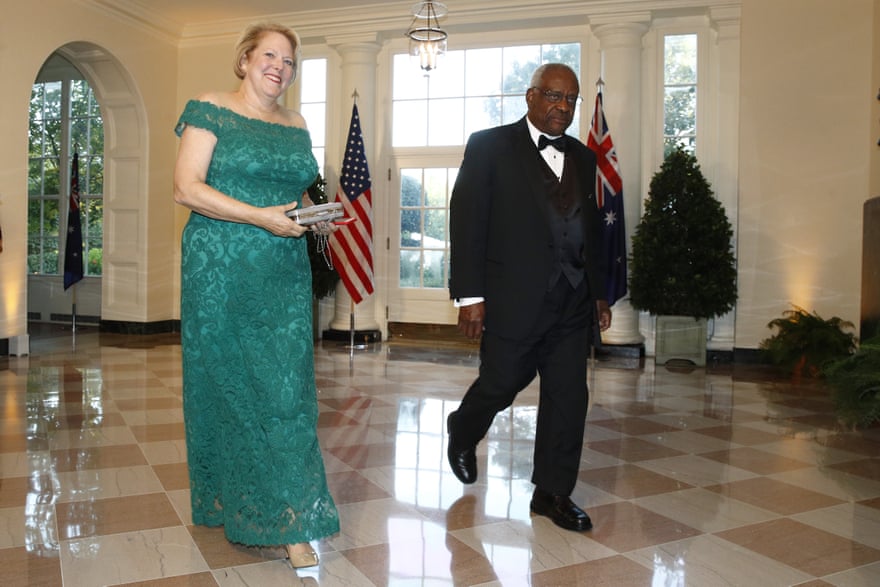
Voilà un tout nouvel éditorial qui va allonger notre revue de presse sur « la justice ».
Le titre troublant (The ‘Thomas court’: after biding his time, rightwing justice finds his power | Clarence Thomas) est parlant.
Présenté sous le nom «d’anonymat
», le pigiste est connu et fiable pour plusieurs autres textes qu’il a publiés sur le web.
Vous pouvez par conséquent faire confiance aux infos qu’il publie.
Clarence Thomas knows the loneliness of the long distance runner – and the rewards. In 1980, with five months’ training, he ran the Marine Corps Marathon in an impressive three hours and 11 minutes. He saw it as a metaphor for his life, he wrote later in his memoir.
The marathon is certainly apt for Thomas’s three decades on the US supreme court. For the lion’s share of that time he was a fringe figure with extremist views. But then the court’s centre of gravity moved his way: Thomas is now the senior member of a group of rightwing justices with the votes to control it.
In the court’s most recent term, the conservative majority handed down sweeping rulings on abortion, climate, guns and religion that look set to reshape America. Although it is colloquially known as the “Roberts court” after Chief Justice John Roberts, some now perceive a “Thomas court” that will continue to turn back the clock.
“By virtue of the fact that Clarence Thomas has been on the supreme court as long as he has, he has slowly gained much more influence and has now become the dominant ideological leader of the conservatives,” said Edward Fallone, an associate professor at Marquette University Law School in Milwaukee, Wisconsin.
“He is certainly more confident and more muscular now that he has allies on his side but he has been strikingly consistent over the decades. He simply waited for the rest of the conservative world to catch up to him.”
Thomas is the longest-serving sitting member of America’s highest court and, in 2028, would overtake William Douglas as the longest-serving ever. The recent retirement of Stephen Breyer meant that Thomas, 74, became the oldest sitting justice. But the swearing in of Breyer’s successor, Ketanji Brown Jackson, meant that Thomas is no longer its sole African American – a status that has proved hugely divisive in light of his deeply conservative views.
Born in Savannah, Georgia, in the racially segregated south, Thomas grew up in the nearby town of Pinpoint, where he has recalled that homes were little more than shacks. He learned Geechee, a Creole language spoken by the descendants of slaves, before standard English, which he has said made him self-conscious about speaking and more of a listener.
Thomas, who was was abandoned by his father as a young child, attributes his success to his grandfather, a believer in tough love who sent him to a Catholic school and encouraged his work ethic. After graduating from the College of the Holy Cross, then Yale Law School, Thomas worked as assistant attorney general in Missouri.
His “pulled up by his own bootstraps” story influenced his ardent opposition to affirmative action, a stance that caught the eye of the Republican party, which Thomas joined soon after Ronald Reagan was elected president.
In 1982 he became chairman of the Equal Employment Opportunity Commission (EEOC), a government agency responsible for enforcing federal laws against discrimination. In an interview with the Washington Post, he complained that civil rights leaders “bitch, bitch, bitch, moan and whine”.
President George HW Bush nominated Thomas to fill the supreme court seat vacated by Thurgood Marshall, a civil rights titan. At a bruising 1991 confirmation hearing chaired by Senator Joe Biden, Thomas was accused of sexual harassment by former employee Anita Hill – charges he denied and branded as “hi-tech lynching”.
Andra Gillespie, an associate professor of political science at Emory University in Atlanta, Georgia, said: “Clarence Thomas’s legacy is complicated. When he was nominated to the court in ’91, it was actually met with support in the African American community.
“When Anita Hill made her sexual harassment allegations during the confirmation hearings, he still enjoyed the support of African Americans, although Black women who were highly conscious of their gender identity were less likely to support him.”
She added: “People were happy to see that Thurgood Marshall’s seat was going to be filled by a Black man and there are ways that, in his personal life, Justice Thomas has been highly supportive of Blacks in the legal profession, particularly Black lawyers who have the potential to be judges. We’ve seen that type of personal advocacy and mentoring in his background.”
But on the court, Thomas was an outlier.
A self-described introvert, he chose not to ask questions during arguments for years-long stretches. And with rightwing views that put him well outside the mainstream, he often wrote solo dissents, quietly assembling his own parallel matrix of legal opinions.
Fallone, the Marquette associate professor, observed: “If you feel that you are on the fringe of a multi-person body, you can do one of two things. You can attempt to join coalitions and perhaps compromise and move a little bit towards the centre or you can stay consistent and be content on the fringe and bide your time until the whole body makeup changes. Clarence Thomas chose the latter route.”
Everything changed with the election of Donald Trump as US president and the appointment of justices Neil Gorsuch, Brett Kavanaugh and Amy Coney Barrett. This meant conservatives enjoyed a 6-3 majority and could afford to lose the vote of Roberts in pressing their rightwing agenda.
Thomas began finding his voice both figuratively and literally. When the court began hearing arguments by phone because of the coronavirus pandemic and changed the arguments’ format so justices asked questions one by one, he joined in. He has continued asking questions since the justices returned to their courtroom last autumn.
Thomas, not Roberts, stamped his authority on the just completed term. He wrote an opinion that the constitution protects an individual’s right to carry a handgun in public. His marathon 30-year effort to overturn Roe v Wade, the ruling that protected abortion rights nationwide, ended in victory despite widespread public opposition.
Even then, however, Thomas was not satisfied as he urged his fellow justices to revisit precedents acknowledging rights to same-sex marriage, gay sex and contraception. Amid national outrage, thousands of people signed a petition saying he should no longer be allowed to teach a class at George Washington University’s law school, but the university nixed the idea.
Some activists warned that Thomas has become a tool of Trump’s authoritarian “Make America great again” (Maga) movement. Using the phrase “the Thomas court”, the Lincoln Project, an anti-Trump group, said in a statement: “The bottom line is that Clarence Thomas is working with other ultra-Maga activists to build a legal framework for the dissolution of rights and freedoms based on his ideology, not the constitution.”

Yet just as Thomas reaches the zenith of his influence, a political scandal could yet tear him down. The justice and his wife, the conservative activist Virginia Thomas, are under scrutiny over their actions following Trump’s defeat in the 2020 election.
Virginia Thomas exchanged messages with the then White House chief of staff, Mark Meadows, encouraging him to work to overturn Biden’s victory and urged Republican legislators in Arizona to choose their own slate of electors. The congressional panel investigating the January 6 insurrection at the US Capitol has asked her for an interview.
Critics argue that Clarence Thomas should have recused himself from a case involving the committee’s access to presidential documents and lawsuits challenging the election results. Democrats in Congress wrote in a letter that his participation is “exceedingly difficult to reconcile with federal ethics requirements”.
Gillespie of Emory University believes that if Clarence Thomas is directly linked to a conspiracy, it would be grounds for impeachment. “But if he is not directly implicated in anything that Ginni Thomas herself is involved in, the larger question is going to be, does he have public confidence enough that he can stay in that position?
“His initial reaction will likely be to double down and say that this has nothing to do with him and that he can continue to do his job. The question would be, would people who are close to him agree with that assessment and would they be in a position of influence to convince him that the optics aren’t on his side and that perhaps he should step down?”
Thomas’s many defenders on the right contend that his wife’s political activism is being unfairly targeted. Curt Levey, president of the advocacy group the Committee for Justice, said: “I don’t think ultimately it’s going to be a problem for him and the court. Certainly the left is going to use it to attack him but they’ve been attacking him pretty much since he’s been on the court.
“The original attack was that he wasn’t very bright and that he was just doing whatever [late justice Antonin] Scalia told him to do. And they’ve been attacking Ginni for a long time.”
Levey added: “I have total confidence that the left will continue to try to cause problems about it because they particularly dislike Thomas – they just cannot stomach the idea of a conservative Black man – and they love to focus on January 6. Trump hasn’t been president for a year and a half and they’re still obsessed with it, long beyond when I thought they would move on.”
The “Thomas court” looks set to continue moving fast and breaking things. Among the cases it has taken up for its next term are a Republican-backed appeal from North Carolina that could give state legislatures more power over federal elections, as well as two that could spell the end of college and university policies considering race in admissions to achieve more student diversity.
Carl Tobias, a law professor at the University of Richmond in Virginia, commented: “Clarence Thomas has always been a mystery to many people. He has a long history on the court and life experiences that are different from many but strongly held views. He’s articulated them and so he’s ascendant right now. It will take some time before the court’s composition changes and before he is less influential.”
Ce thème vous a plu vous apprécierez également ces parutions:
De la justice dans la Révolution et dans l’Église/Huitième Étude,(la couverture) .
La Justice française pendant le siège,A voir et à lire. .
Valeurs et justice,A voir et à lire. . Disponible sur internet.
